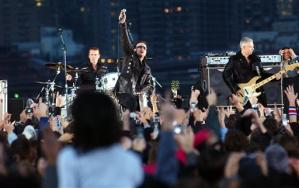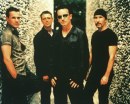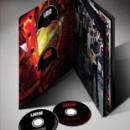 U2 are re-releasing their classic album Achtung Baby to mark its 20th anniversary. In our latest visit to the archives of Rock's Backpages – the world's leading collection of vintage music journalism – we reprint an interview by the late Robert Sandall with rock's new arch ironists that was first published in May 1992
Having, by his own account, spent most of the 1980s "trying to dodge being a rock star," Bono (aka Paul Hewson, the singer and most prominent member of the Irish supergroup U2) now looks like a caricature of a man making up for lost time.
His sudden arrival last Wednesday in the lounge of Zurich's Dolder Park Hotel has much of the glam élan of his entrance, earlier that evening, on to the stage at Zurich's Hallenstadion. The wrap-around, bug-eyed shades and slinky man-in-black designer outfit, nattily set off by a small but perfectly-formed cigar, are all very New U2: a bit flash, a lot more fun. Heavier on style, lighter on content.
The band's guitarist, known as the Edge but christened David Evans, is perched on another of the Dolder's enormous sofas sporting an equally frivolous, rockist get-up of his own sequinned leather jacket, pale tangerine stripy jeans and a black woolly skull cap.
"We used to want to be heavier, because it seemed right at the time," Evans explains in his quiet way. "We objected to all the irony in rock music in the 1980s, but now that ironic attitude seems about right. The best response to what's going on in the world at the moment," he concludes, lapsing briefly into U2's original, more portentous mode, "is just to laugh at it."
While they are still performing a few of the spiritually uplifting anthems of old on the current tour – notably Pride, a song about Martin Luther King, and I Still Haven't Found What I'm Looking For, a sort of hymn for rocking agnostics – their latest album, Achtung Baby, has called a halt to the earnestly tuneful moralising that made U2 into the rock band of the Live Aid era (40m albums sold worldwide).
Recorded last year at Hansa studios in Berlin, Achtung Baby plays down U2's trademark Celtic-derived melodies, epic chorus lines and echoey guitar surges. In their place is a murkier sound wash that merges voices and instruments into an opaque turbulence of electronic clatter. It's harder to sing along with, but more rewarding to listen to than their eminently hummable blockbuster from 1987, The Joshua Tree.
You can, at a push, dance to it. "And it's a lot less tense playing it live," says the Edge.
There are precious few audible signs left on it, anyway, of the Dublin punks who started out in the late 1970s sounding like a very rough sketch of the Who. The Brian Eno influence, first apparent on The Unforgettable Fire the 1984 album that they talked Eno into co-producing with Daniel Lanois, established U2 as the world's first truly popular arty guitar band. And aligning themselves with creative folk from areas beyond their own, rather than simply hanging out with other rock stars, has stimulated their appetite for innovation. The German film director Wim Wenders is a close friend of the band. The Edge has worked with the British composer Michael Berkeley and scored a theatre production of A Clockwork Orange. Bono takes a strong interest in the work of young Irish artists.
The new show, a two-hour audiovisual extravaganza that made its debut in the US in April and arrives at the Earl's Court Arena tonight, is by far U2's artiest effort yet. Though I have never heard the band sound so sharp, particularly in the first hour during which the newer songs were aired, this was as much a video installation as a rock concert. It certainly boasted many more screens than amplifiers, on which were flashed up a mind-boggling combination of sequences by Brian Eno, a blizzard of slogans, headlines and teasing mottos as well as, on the night I saw the show, a video made by a woman in the audience who was invited on stage by Bono, given a hand-held recorder and an encouraging squeeze, then left to get on with it.
Above the stage dangled seven resprayed Trabants, mementos of the city where Achtung Baby was recorded, refitted now as flying lighting pods. These gave the proceedings the air of a surrealist motor show and, incidentally, earned the tour a feature in a car magazine in the US. And so the list of cameo turns and coups de theatre went on: a belly dancer wiggling and swaying to Mysterious Ways, a live telephone call to the Swiss speaking clock before Light My Way, and the band performing Angel of Harlem as an acoustic quartet on a small, secondary stage in the middle of the arena.
The most impressive aspect of the production, though (aside from the fact that it will never make money until it plays to larger, outdoor audiences when it returns to the US this summer), is that it is constantly evolving: at Zurich we saw the premiere of a hilarious "commercial" for some of the hits that ended the performance. In London tonight more surprises are promised, although they are unlikely to be as arresting as the stunts U2 staged in the US, delivering 100 pizzas from the stage into the arena, communicating with a Russian astronaut circling the Earth in his spaceship, calling up a telephone sex line. The sense of spontaneity amid technological complexity is remarkable.
What, if anything, it all means, however, is a good question, and Bono isn't answering it. Meanings and messages, you feel, are yesterday's news for U2, good, perhaps, for grinding down into little bits and projecting on to a screen. "Rock'n'roll is mystery and mischief,"
Bono says in a gruff Dublin brogue. "We used to be terribly ascetic as a band but some of that rock'n'roll bullshit is pretty cool. I'm trying to teach myself how to do it, you know, wearing dark glasses indoors, getting drunk …" He grins, takes off the shades, orders a cup of tea and grins again. "Van Morrison started off singing about girls and ended up singing about God. With us I guess it's been the other way round."
U2 are, you realise, extremely well up on self-presentation, and no strangers, either, to media studies. For a rock band so often taken as one of the last bastions of we-mean-it authenticity, they now seem acutely aware of how they are perceived. Their manager, Paul McGuinness, attributes the change in direction on Achtung Baby to a mild critical backlash that greeted U2's 1989 big-screen documentary feature, Rattle and Hum. Though the album sold a handsome 11m worldwide, the movie, according to McGuinness, "got right up people's noses. The aesthetics were cancelled out by the size of the campaign."
The new album, and a tour that refuses to linger more than one night in any city, carefully distance the band from all charges of grandiosity. But the trick lies in the presentation. The new-look U2 is just "misinformation" really, according to Bono. "We've made what I think is our heaviest-sounding album and everybody thinks it's rather funny because there's a picture of Adam (Clayton, bass player) on the cover with no clothes on. When we did those cover shots in the desert for The Joshua Tree, which is always taken to be our most serious work, we could hardly keep a straight face."
|
  No Line on the Horizon - 2009
Pop - 1997
Zooropa - 1993
Achtung Baby - 1991
Rattle and Hum - 1988
The Joshua Tree - 1987
The Unforgettable Fire - 1984
War - 1983
October - 1981
Boy - 1980
|